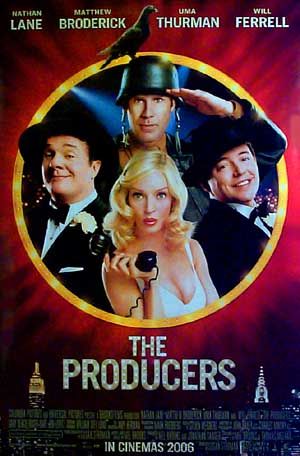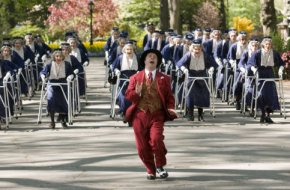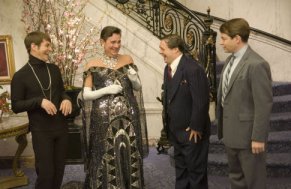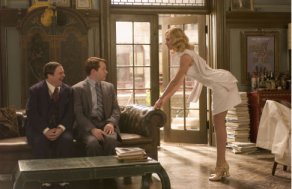Before
Mel Brooks became known for his films parodying genres like
Blazing Saddles, Young Frankenstein and High
Anxiety, he wrote and directed arguably one of the funniest
films of modern times. Thirty years later he turned it into
a full-fledged Broadway musical, and now The Producers
has been, not exactly remade, but transferred from film to
stage to film by Susan Stroman.
For fans of the
original film, this may seem redundant. Though the stage
show did veer in the third act, it still owed a lot to the
original brilliance of Zero Mostel and Gene Wilder.
There. I've said it. Just as in the road companies, whoever
plays Max has to make a self-deprecating remark about being
no Nathan Lane, now we have to acknowledge that Lane himself
is no Mostel. Luckily, Lane is an actor that takes Max Bialystock's
advice to heart: "if you've got it, flaunt it."
Like Rent earlier this
year, The Producers exists as a record of brilliant
performances in a show that once was credited for "saving"
Broadway. As such, it has some transporting moments, and
some that just don't work because director Stroman has an
occasionally difficult time adjusting to film.
Numbers like "I Want To Be a Producer" start to play with
the possibilities of being in the cinema, but ultimately,
Stroman makes it feel literally stagebound. Sure, Matthew
Broderick sings about working on Broadway, so maybe that's
forgivable.
When Stroman simply takes her original choreography for
"Little Old Lady Land" and puts it in Central Park, though,
it's a waste of talent. Included in that waste of talent:
Andrea Martin, whose cameo has gotten cut to her just being
a piece of a faux septuagenarian chorus line. Unfortunately,
it calls attention to the artifice of younger dancers doing
a silly number that just doesn't seem as fun onscreen.
Lane works, no question, and his show-stopping number
"Betrayed" still has a lot of the power he had on stage,
even though it's still set in a tiny little cell. It's one
of the few numbers that feels like it needs that little
hold and pause for the audience to applaud.
The actor's persona has always been out-sized (just as
his eyebrows) and he has the timing of a classic vaudeville
comic. As a faded Broadway producer reduced to seducing
senior citizens, he makes desperation funny. Better yet,
he also makes the lines his own. If there's a nod to the
original, it's in the thinning of his hair to mirror Mostel's
appearance.
The only problem with Lane is in fitting him opposite
Matthew Broderick. On stage, audiences may forgive the fact
that he appears to be a slightly smaller man. Broderick's
Leo Bloom then becomes an even bigger coward than before,
because Lane may be loud and bombastic, but he is not particularly
intimidating.
Of course, like the dance numbers, Broderick has been
directed to be pretty much the way he was in live theater,
and occasionally that gets annoying. For a character as
crucial as Leo, we need to get a flash that he might function
as a real human being. But Broderick's delivery is all rhythm
and vocal tics, little actual character.
It becomes readily apparent when the film shifts into
the production of Springtime For Hitler, the surefire
bomb that Bialystock and Bloom use to perpetrate their fraud.
It's longer here than in Brooks' original film, too, which
isn't a waste of time - Brooks just keeps tweaking musical
conventions, and Stroman has one great visual joke juxtaposing
stormtroopers with chorus boys. Otherwise, though, there's
no difference in performance style between the campy action
of the show-within-a-show and the supposed real life.
Yet for the other actors reprising their roles, it fits.
There's no other way for gay stereotypes Roger De Bris (Gary
Beach) and Carmen Ghia (Roger Bart) to be. It may not be
very advanced or politically correct, but let's admit it,
it's funny. Heck, they've even got Jai from Queer Eye
as a houseboy, so it must be okay.
The newcomers to the production are clearly there to bolster
the marquee value with moviegoers, with mixed results. Uma
Thurman can't sing, but she dances passably and shakes admirably.
As the pathetic former Nazi turned musical writer Franz
Liebkind, Will Ferrell brings the commitment level that
he lacked in Bewitched. The role was a cartoon character
in the original film, and it's to Ferrell's credit that
he manages to make it a different cartoon than Kenneth Mars
did.
Strangely, that Nazi stuff seems to have lost the power
to shock. In the decades since the original film, the concept
of a campy musical about World War II seems old hat, and
Mel Brooks himself has a lot to do with that. It may stretch
modern audiences' suspension of disbelief to accept that
anyone wouldn't have gotten how deliriously stupid Springtime
For Hitler is, yet because of that joke, Germany banned
The Producers for years.
With everyone singing and dancing all the time in this
version, the shock value is further blunted. It still has
its fun moments, and of course, fans of the Broadway show
will be thrilled by the film.
If you're a fan of the original, still give this a look.
The Producers the musical has new things to offer,
including the best end title "monkey" of the year. If you
haven't seen the original, see both.
Rating: 









